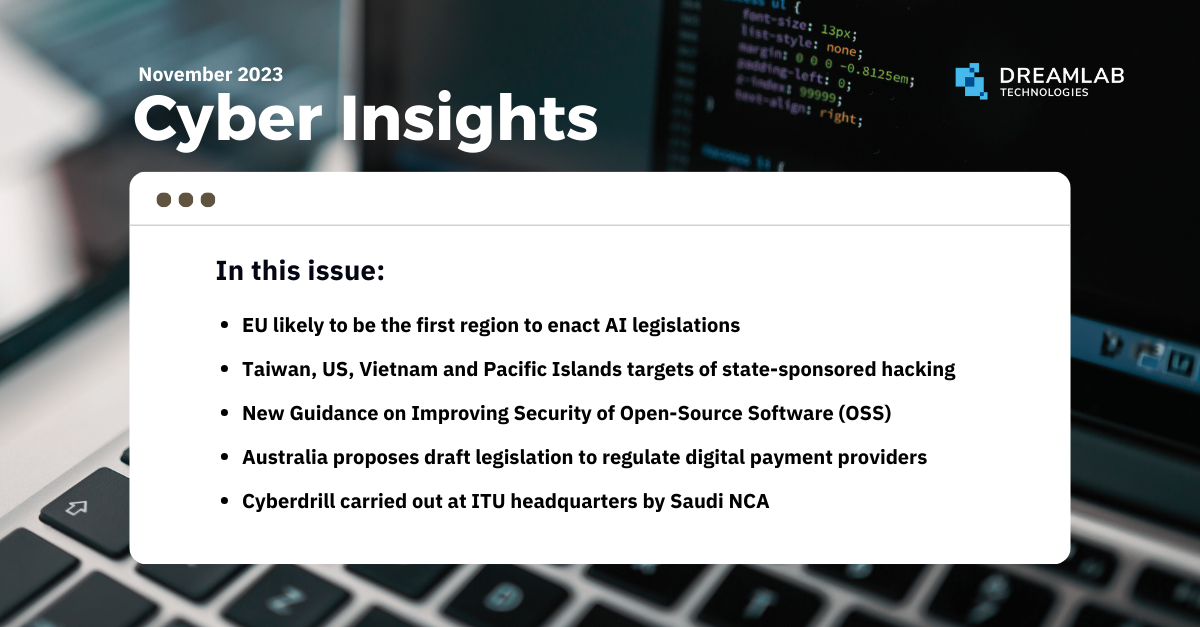
Dreamlab Technologies presents to you our brand new вАШCyber InsightsвАЩ newsletter вАУ an expert analysis of the latest developments in the cyber domain across the globe. The cyber world is a world full of opportunities, but unfortunately faces new and emerging threats every day. This newsletter contains insights and trends in cybersecurity and emerging technologies that will help you stay informed regarding the threats and challenges in today’s rapidly evolving digital world. It also comes with a brief analysis of the cybersecurity events from a geo-political perspective. In the evolving geo-political dynamics today, cyber-security is increasingly being prioritised by countries worldwide. Stronger cyber defence capabilities, higher investments in cybersecurity budgets and facilitating cyber policy dialogues are some of the new trends observed in the global geo-politics. The concise content in this paper provides a glimpse into this global scenario concerning the cyberspace. It is easy to read and can help promote awareness regarding best cybersecurity practices and safeguard our digital lives.
Inside this issue:
- EU likely to be the first region to enact AI legislations
- Taiwan, US, Vietnam and Pacific Islands targets of state-sponsored hacking
- New Guidance on Improving Security of Open-Source Software (OSS)
- Australia proposes draft legislation to regulate digital payment providers
- Cyberdrill carried out at ITU headquarters by Saudi NCA
In this edition we delve into the most recent developments in the draft Artificial Intelligence (AI) regulations in Europe. Once passed by the European Parliament, the regulations could most likely become the worldвАЩs first legislation on AI. The long-standing debate surrounding AI has raised potential concerns regarding its ethical dimensions, and the implications it could have on humanity. At this crucial juncture, an open dialogue and regulatory effort like this, could go a long way in addressing the issues cautiously and striking a balance between harnessing this technology and ensuring the ethical standards.
Spanning Asia, countries like Taiwan, Vietnam, the Pacific Islands become the target of state-sponsored cyber-attacks. Research from Symantec reveals that a hacker group operating from a region with вАЬstrategic interestвАЭ in these countries, hacked organisations with the main goal of espionage rather than financial motives. The incident once again stresses the need for better collaboration, sharing of intelligence and coordination among international stakeholders to address cross-border cybercrimes.
In the US, the Cybersecurity and Infrastructure Security Agency (CISA) along with other organisations published a new guidance on improving the security of Open Source Software (OSS) in operational technology and industrial control systems, as a response to concerns related to cybersecurity and safety of critical infrastructure organisations.
Across Oceania, we take a look at the draft legislation proposed by Australia that seeks to regulate digital payment providers in the country. With the rapid increase in digital and mobile wallets in recent years, countries have started to designate these new and emerging payment systems within their financial regulatory system as citizens are largely dependent on them for day-to-day monetary transactions. Ensuring a safe and secure financial ecosystem is a prerequisite for citizensвАЩ participation in the society via digital channels as well as for exercising fundamental human rights.
And back home in Switzerland, the Saudi National Cybersecurity Authority (NCA) carried out a cyberdrill at the International Telecommunication Union (ITU) headquarters in Geneva, to raise the level of cyber readiness, and enable the exchange of information and knowledge in cybersecurity.


